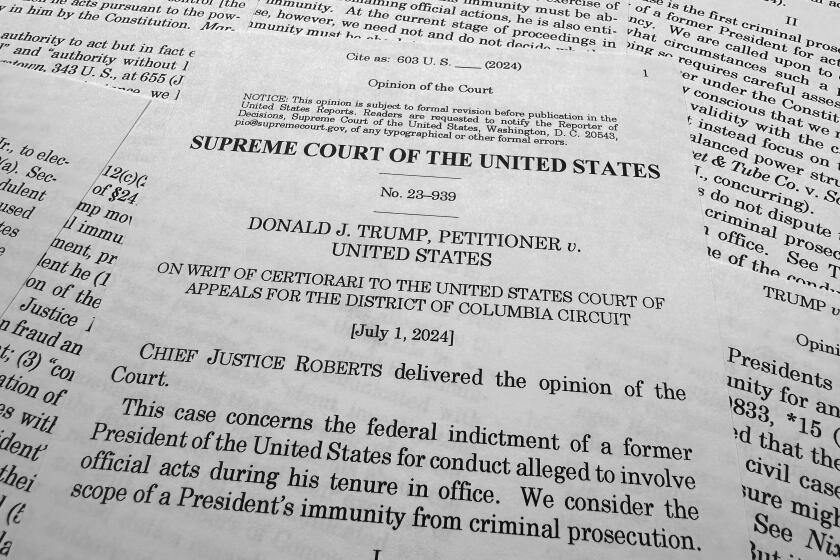Opinion: The Supreme Court is power hungry. There is one sure way to rein it in

- Share via
President Biden’s initiative to establish Supreme Court term limits and an enforceable ethics code could help restore much needed public trust in the court. Just as importantly, it’s a reminder that we need not surrender to a court that has aggrandized itself at every turn.
The president’s proposals will require congressional approval, and that in turn highlights the role every American can play in reining in a court that has tilted into ideological activism: The key is what we do on Nov. 5. You were probably taught that the justices have the final say on our laws, but in reality that power belongs to voters.
Most of Biden’s proposed Supreme Court reforms appear to be political talking points, but term limits for justices is an idea gaining support on both sides.
To start, there is no question that the court would be better off with term-limited justices who can no longer play politics with the timing of their retirements, and with an ethics code that has teeth and could eliminate even the appearance of impropriety in the justices’ behavior.
But the president should be asking for more — congressional action that responds specifically to the alarming decisions issued by the court’s current conservative supermajority.
Its most dangerous ruling, delivered on July 2, was its holding that Donald Trump enjoys “presumptive” immunity from criminal prosecution based on his “official acts.” The upshot is that the court, not a jury of ordinary Americans, will likely get to make the final call on Trump’s accountability for his 2020 election falsehoods and schemes.
The justices facilitated government and corporate corruption by weakening laws and regulations affecting the environment, finance, public officials and more.
In another sweeping decision, the court set aside four decades of precedent and arrogated power long held by federal agencies. Instead of deferring to, say, the Environmental Protection Agency on the technical how-tos of applying laws like the Clean Water Act, the court claimed that it should have the final say — expertise and democratic accountability be damned.
The court similarly substituted its judgment for the otherwise apparent meaning of federal statutes by upending what constitutes a “machine gun” and obstruction of official proceedings. As Justice Amy Coney Barrett wrote in her dissent from the latter ruling, the majority had to do “textual backflips to find some way — any way” — to get to its preferred outcome. In doing so, it blocked a crucial gun safety measure and narrowed the basis for charging those involved with the Capitol attack on Jan. 6.
Fortunately, as supreme as the Supreme Court is, it doesn’t have to be the final word on these cases. The court gets to interpret the law, but we voters, through our representatives, decide what that law is.
The Republican-appointed majority’s rhetoric says the president isn’t above the law, but its decision in Trump’s immunity case says otherwise.
For those who object to the current court’s power grab, that means showing up at the polls this year and voting for a Democratic majority in Congress, despite reasonable, good-faith disagreements with President Biden and his party. Those concerns will matter little if an unaccountable Supreme Court continues to aggrandize itself at the people’s expense.
Here’s how a Democratic majority could push back.
In the presidential immunity case, one worry is that even if lower courts deem much of Trump’s Jan. 6 conduct to have been unofficial, and thus subject to prosecution, the Supreme Court’s conservative justices will simply band together to reverse that determination.
America declared independence from kings 248 years ago. The right-wing Supreme Court majority undid it.
And yet Article III of the Constitution allows Congress to make “exceptions” from the Supreme Court’s power to hear appeals. A reestablished Democratic House majority could pass a law declaring the lower court’s ruling final, and a Democratic majority in the Senate could do the same by voting for a one-time suspension of the filibuster, just as the Republican majority did when it confirmed Neil M. Gorsuch to the Supreme Court.
As for the court’s takeover of deference to federal agencies, a Democratic majority in Congress could amend the Administrative Procedure Act to unambiguously grant agency experts the benefit of the doubt on reasonable regulations. Likewise, a Democratic Congress could enact legislation to override the court’s aberrant interpretations of laws regulating machine guns and defining the obstruction of official proceedings.
If voters in November keep the court in mind as they mark their ballots, they can not only undo this term’s most harmful decisions, but also send a forceful message to the power-hungry justices: The highest court in the land can either have the final word on the hard cases that divide us, or it can lurch the law far to the right. But it can’t do both.
Aaron Tang is a law professor at UC Davis and a former law clerk to Justice Sonia Sotomayor. He is the author of “Supreme Hubris: How Overconfidence Is Destroying the Court — and How We Can Fix It.” @AaronTangLaw.”
More to Read
A cure for the common opinion
Get thought-provoking perspectives with our weekly newsletter.
You may occasionally receive promotional content from the Los Angeles Times.














